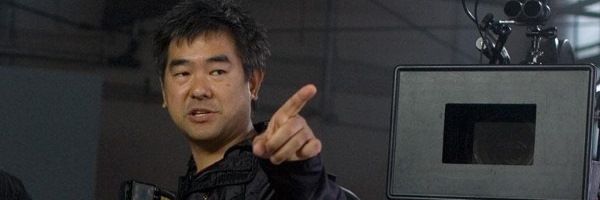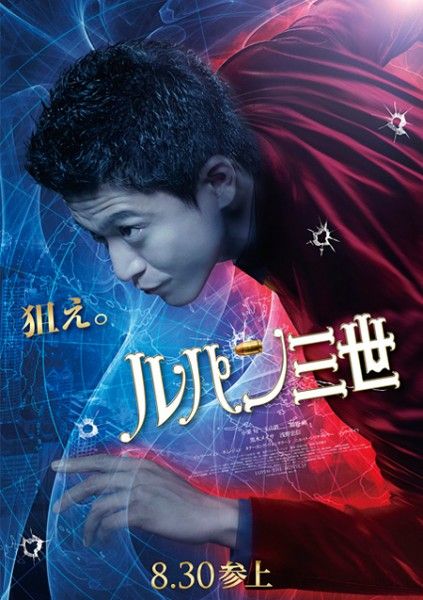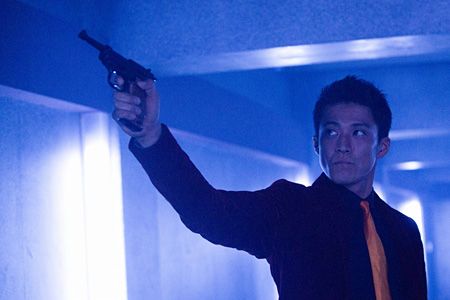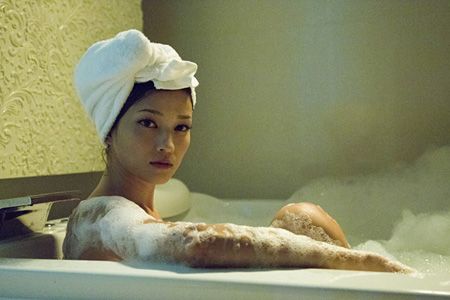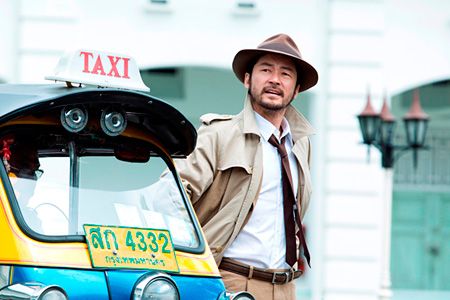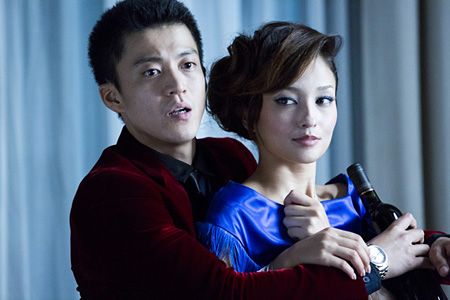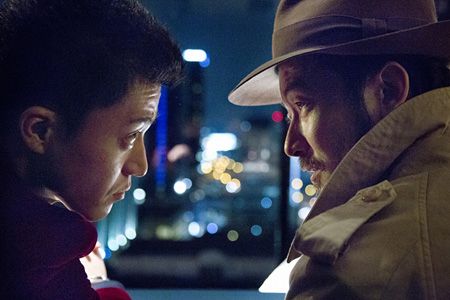Lupin the Third is an icon in Japan. The manga by Monkey Punch has inspired a slew of content – five animated films, four anime television shows, two live-action films, a video game and even a musical. Yet until about three weeks ago, I had never even heard of the property. How can something be so omnipresent in Japan yet so niche here in the US? It’s strange in that Lupin - a pretty straightforward comedic caper – seems very easily translatable to these here shores. Think Ocean’s 11 except a little bit goofier and with a lot more swords and gunplay. The basic plot follows the world’s greatest thief, the titular Lupin III, as he and his motley crew (an expert marksman, a Buddhist swordsman & his on-again-off-again traitorous paramour) plan and steal the world’s greatest treasures.
Filmmaker Ryûhei Kitamura, who got his start with the Japanese indie Versus before coming over to the states to direct the cult horror films Midnight Meat Train and No One Lives, returned to Japan to helm the second live-action version of Lupin The Third. It’s a breezy and light adaptation – one that’s as accessible to fans of the series as it is to those discovering it for the first time. In the following interview with Kitamura, he chronicles the arduous three-year process to bring the film to the big-screen, the difficulties of working within the Hollywood and Japanese film systems, and what projects he’s currently trying to get off the ground now. For the full candid interview, hit the jump.
How familiar were you with the manga beforehand?
RYÛHEI KITAMURA: Lupin the Third is one of the most famous name titles in Japan. To me it was like water or air. It was always there my entire life. Of course when I moved to LA eight years ago, it’s not around; but in Japan – it’s always there either in a comic book or an animated movie.
Was there a script in place before you came onto the project?
KITAMURA: Not really. There was a script but the producer [Mataichirô Yamamoto] decided to start from zero. Almost three years ago, Mata and I were working in his house, figuring out what to do.
What was the adaptation process like then?
KITAMURA: It's not that easy because you have hundreds and thousands of comic books -- but they're all tiny short stories. There's no big dramatic relationship that exists even in the original. It wasn't like Midnight Meat Train or Azumi which had more of a story. That's why [Mata & I] were like ‘where do we begin and how far do we go?’
Where do you find that starting point? What’s the kernel that you build on?
KITAMURA: [Mata and I] spoke about everything and we watched the animated movies and we read all the comics again and in the end we decided we're not going to copy any of them -- any of the movies or comic books. We have to do our new version of Lupin the Third. Then we came to the point where this has to be episode zero: the origin story of the movie version of Lupin the Third. We made that decision after three or four months talking about all kinds of directions and then we had our starting point.
It's a movie about thieves - so when you're talking about this adventure story of thieves, what is it then that they're after? We went through all different directions like a cursed diamond from the Smithsonian. Then we thought about maybe this Ancient Soviet tank with a giant treasure. We were looking into all kinds of territories but it was very hard because there are way too many spy movies and treasure hunting films. It's been done a hundred times. What is a new treasure? That's when I had brought in my buddy -- he's the strongest weapon I found in this crazy town of Hollywood -- Joey O'Bryan. He wrote [Johnnie To’s] Full Time Killer and Motorway. He's from Texas but I've never met anyone who understood the Asian and Japanese culture more than this guy. He knows even more than me. I called him up and said, ‘You have to jump on a plane tomorrow and come to Osaka. I'm doing Lupin the Third and I need your help.’ So he came and there were the three of us: Mata, Joey and I. We spent a lot of time figuring out the story then. Joey and I wrote three different scripts. I gave it to Mataichirô [who in addition to producing is a writer on the film]. He started writing his own script using bits and pieces of the three drafts we came up with.
How similar were the three scripts?
KITAMURA: They were completely different. That was a creative difference between Mata and I. We did a movie together Azumi and I'm very proud of that movie. That was the movie that changed my life. But the way he does things -- he just wants to go in all different directions. That's fucking tiring. Life is too short. I felt like why don't we just go in this one direction but he's the kind of guy who wants to try all [different things]. He wants to fill in the maze… Once the filming starts, [Mata] doesn't come in. He trusts me -- which is good. But when we’re doing the story and the script, we always have a serious fight. His theory is you're never going to make a good movie if everyone is in synch one-hundred-percent. If everyone agrees one-hundred-percent, then the movie’s [appeal] is going to be very narrow. By arguing 'I think this is the right way or that is the right way' -- you widen up all these possibilities. That's how he works. It's a tiring process but maybe it's true.
[What were the differences you two had?]
KITAMURA: The first thing Mata said was 'we don't do comedy'. Really? If we take out the comedy element, it's not going to be Lupin the Third. I understand [though]. American comedy works but the Japanese comedies never work… [But] I'm not talking about making this a pure comedy. We just have to have these fun moments. But that was a big fight. Then he started talking about the ‘reality’. He would say this [part of the script] doesn't work – ‘it's out of reality’. Then I would say 'If you care about the reality, we shouldn't be doing this movie.' Who wants reality when you go and see Lupin the Third? Forget about the title Lupin the Third. Because if you think about the reality, thieves don't wear red jackets. Those two were the biggest arguments we had to get through.
Well -- judging by the film, it seems like you won both those arguments...
KITAMURA: Yeah -- I won and I ignored [him] because I knew I was doing the right thing. But Lupin’s basically a ‘superman’. He's wiser than everyone and he's always ten steps ahead. So Mata thought -- and this part I agree with -- it's extremely hard to make drama around [Lupin] because there's not much struggle. He's always right and he always wins. But we still need somebody who can drive the story. That's why we came up with the idea of this enemy character Michael Lee but then the problem was we’re not making Michael Lee, we’re making Lupin the Third. It's just a matter of balance… I had to fight to cut things out because the original script Mataichirô gave me was four hours long. Really? Are we making Nymphomaniac Volume One and Two? This can't be four hours. Are you out of your mind? It was like three hundred pages. That was the hard part because the producer was the writer and the producer side of Mata disappears when he goes into screenwriting.
Yeah -- why would he want to produce a four-hour film?
KITAMURA: Exactly. That’s the part I should be taking care of. There's a reason [Mata] chose me to direct this one. He’s never going to give me the easy job because he knows I'm as crazy as he is and I'm going to end up ignoring what I don't like and I'm going to cut out whatever I don't like and end up doing whatever I want to do anyway. I don't think it's that healthy of a process but somehow Mata and I only work this way.
How does this process compare towards working within the U.S. Hollywood system? Do you feel like you have more control on a project like Lupin?
KITAMURA: Not really. The Hollywood system has its own problems. Movie making is never an easy job. That's what I know. It doesn't matter where you make movies or what the size of the movie you make is. It's a very hard job -- especially director. Because producers say things that they would like to see in the movie but they don't see the full picture. In the end if you ignore everything the producers say, of course, you get fired; but then if you listen to a producer on everything then it's like 'Hey -- why don't you direct your own movie?' That's the balance I have to figure out. Because, of course, producers don't like the director who ignores their opinion -- but I always try not to be the nicest person when making a movie. It's easy to do that. Just say 'Yes sir', "Alright', 'Okay' -- but they're not seeing the movie because if they can, they should be directing the movie. But at the same time I do understand the things they are saying make sense from their point of view. So I feel like I have to respect that because they are the ones giving me the opportunity to make films in the end. If I could finance my own movies, I would be doing it -- which I did on Versus. I'm ready to go back.
To independent financing?
KITAMURA: That's what I did. Still at the premiere of Lupin The Third, everybody's asking about Versus 2. So I know that I'm doing very good and I can go back. But at the same time I do have a lot of respect because if it wasn't for Mataichirô, I wouldn't have the opportunity to make Lupin the Third. It was challenging but still it's Lupin the Third. If you get the opportunity, that's something. I always respect my producers. Wherever I make a movie, no matter what size it is, it's always about a straightforward communication with the producer. Ultimately I'm making movies because of the producers and I don't want to disappoint my producer. It's always a tough balance to figure out how far I listen to them though.
What is your process with fight choreography? That seems like such an integral part of your films...
KITAMURA: I've worked with all of the best. Almost everybody in the Japanese industry doing action. The guy I did Versus with was great. Azumi was a different guy and he was great. I worked with 87eleven on Midnight Meat Train who is the best of the US. I wanted to try something different for [Lupin]. But it was a Japanese movie so it was too expensive to bring in one of my guys from here. Hollywood industry people are very spoiled. I don't think they can adjust to the insane, no-money, super-hard working tradition of Japanese filmmaking. I don't think any American can go through that. They don't want to work more than twelve hours and they want Saturday and Sunday off. I'm sorry, buddy, but Japan doesn't work like that. You have to work like a war dog. So I brought these two genius guys from Korea because I believe Korea is making the best movies these days. Only in Korea - you can do whatever you want to without any rating system or whatever. They can make world-class karate movies and make lots of money, which is very important. Big hits movies and best [reviewed] movies are not equal. That's why there are lots of shitty American movies making tons of money. But a great movie like Drive -- it's not going to be the number one hit. That's the reality. But in Korea - if you make that type of movie there, it's going to be a number one hit. So I brought in two genius guys from Korea. Guys who did my favorite movies like Oldboy and The Man from Nowhere. It was fun working with them. Even though they don't speak Japanese and I don't speak Korean, I knew from day one we were speaking the same language because they love my work and I love theirs. We instantly connected. There was zero frustration.
Do you just let them choreograph the fight scenes?
KITAMURA: I'm not that easy on my crew -- so of course I'm like "Nahh... I don't like this or that. And I want something more like this.' We did a great collaboration so that was pure fun.
Lupin The Third seems like a tonal departure for you. Is that a conscious decision on your part - to branch out and not be defined by horror films and more violent fare?
KITAMURA: I don't really consider myself a horror director or a violent director at all. In Japan [Lupin III] is rated G.
How do you approach a PG film differently than an R-rated film?
KITAMURA: It all depends on what kind of movie I'm making. When I was making Midnight Meat Train or No One Lives, nobody told me to go for a PG-13 -- so I went extreme. But, of course, with a movie like Lupin the Third, it's completely different. I knew I had to make a movie more for the family and a younger audience.
What are you working on now? Are you coming back to the US?
KITAMURA: Of course -- until they call me back for Lupin the Third Part Two, which I should be making hopefully within one or two movies. I'm in the middle of discussions about what I'm doing next.
What type of genres are you looking towards?
KITAMURA: I'd prefer to do an action movie but somehow because of those two movies I did, I'm meeting a producer to do this super bloody gore movie. I don't know if I'm going to do this or not -- but I'm meeting the producers anyway. As a fan -- yes I want to do it but moviemaking is a hard job and this industry is crazy. You never know what is going to happen. I have three or four signed contracts but the question is when are we actually going to do it? Sometimes they want to announce it and go to Comic Con. I remember five years ago, I went to Comic Co with Gale Anne Hurd announcing this movie called Magdalena based on the comic. If you Google Magdalena and I, you can find lots of pictures of everybody and I in front of hundreds of fans. Why are we not making this movie? It's always like that. Even when you do the big announcement, the movie sometimes never happens. I wasn't expecting this at all -- but last week my agent and manager called me and said ‘This is it. This is a big franchise horror and they're looking for a director right now and they're interested in you.’ So they sent me the script. I'm in the midst of it now. I don't know… It'll either be me or somebody else.
Lupin The Third is currently waiting on US distribution. It opened in Japan earlier this year in August.

